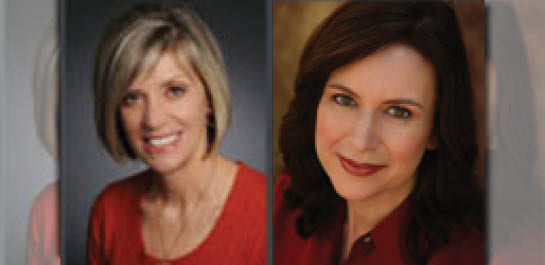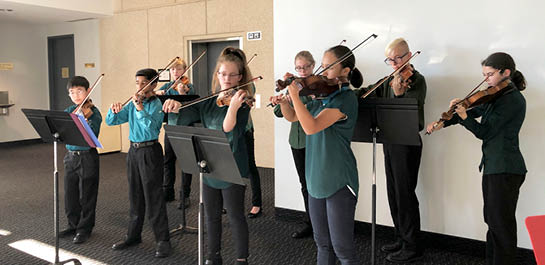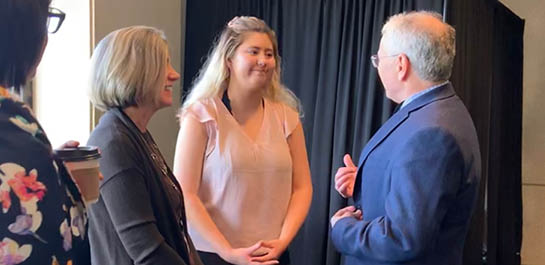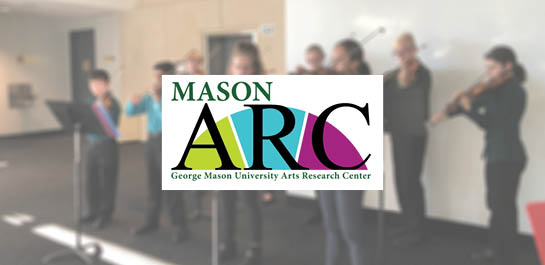Mason Community Arts Academy joined the Mason Arts Research Center (MasonARC) on a multi-faceted research project funded by the National Endowment for the Arts to explore arts education and its impact on child development. Findings from the first phase were revealed at the inaugural research conference on Friday, October 18, which culminated with a performance from Academy’s student musicians.
Supported by NEA, the research focused on three areas of study, including students’ academic performance, emotion management, and social-emotional development, and it also evaluated a set of secondary topics such as critical thinking, communication skills, and arts pedagogy. The Academy worked closely with Dr. Thalia Goldstein, Mason assistant professor of applied developmental psychology, on emotional expressions and social skills of children ages 8-10.
Dozens of Academy students from acting, music, and visual arts programs volunteered in several studies, acting out monologues and talking about characters to help the scientists.
“Currently, our Academy students are exploring monologues, and how they feel in imaginary situations,” said Associate Director Mary Letcher. “This gives the young actors another outlet for performing, and another chance to use the techniques they’re developing in our acting curriculum.”

During the conference, titled “Making Connections for Arts Education Research, Policy, and Practice,” the MasonARC team reported the findings from their investigations and provided space for an in-depth discussion on academic research, local and national policy, grantmaking, and arts practice with local artists, lawmakers, educators, and students and parents. Executive Director Libby Curtis and Associate Director Mary Letcher represented the Academy at the conference, sharing our mission and recent events with the guest attendees.
“The Academy is honored to be a partner with the Department of Psychology for this important initiative sponsored by the NEA,” said Curtis. “This first MasonARC conference was eye-opening and highlighted the importance of quality arts research along with tangible and well-articulated results, that can be used to support the arts in our communities and beyond.”
Piano student Chloe Lewis and the Patriot Violins represented the Academy and performed a delightful selection of music, including “Duet for Two Little Witches,” by Behzad Rankbaran; “Polster-Tanz,” by Bela Bartok; “Dear Theodosia” from “Hamilton,” by Lin-Manuel Miranda; and “Friss Czardas,” by Bonnie Greene. Four student violinists also performed solo works while the conference attendees had discussions among the poster presentations. Accompanied by Mason professor and Academy Teaching Artist, Dr. Ina Mirtcheva Blevins, the solo performances included “Moto Perpetuo,” by Carl Bohm performed by Lindsey Gibson; “Concerto in A Minor, Op.3, No. 6,” first movement, by Antonio Vivaldi performed by Bailey Pavitt-Graff; “Concerto in A Minor, Op. 3, No. 6,” third movement by Antonio Vivaldi performed by Rishi Kannan; and “Meditation” from “Thasis,” by Jules Massenet performed by Joshua Gwon.

“Patriot Violins is a new ensemble we created this year with the goal of having our young violinists form a close-knit ensemble who will represent MCAA in the community,” said Ms. Claire Allen, Academy Violin Teaching Artist and Faculty Coordinator. “They encourage each other in their individual work and bring great energy, enthusiasm, and creativity to our rehearsals. Performing outside of the traditional recital setting is so important for artists of every level to directly engage in their communities and bring music to the people around them.”
The research initiative will continue exploring many topics in the arts and child development, and Academy will be a significant partner supporting their endeavors.

“It is a real privilege to work with the Arts Research Center faculty and staff, introducing them to young actors who would be good candidates for their studies,” said Letcher. “The data gathered in this research is crucial for use in seeking funding for further studies, and for the overall growth of arts education programs.”
If you would like to be involved in the next phase of research, we are looking for students ages 8-10 to participate in an upcoming research topic on how acting out characters or thinking about art can affect their social and emotional development. If your child is registered for private lessons or group classes in acting, music, or visual arts and would like to participate in an one-hour study, please contact the office at 703-993-9889 or email [email protected].

